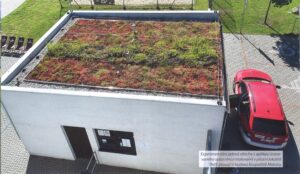Project REVOZIM for water recycling and waste management
In the AdMaS Center at the Faculty of Civil Engineering of the Brno University of Technology (BUT), the project REVOZIM – Recycling of water and waste within the green infrastructure of cities was completed last year. The project should help with technical solutions and strategies in the field of water and organic waste management. This area is more demanding for smaller towns and villages with up to 10,000 inhabitants than in the case of large cities, as they have limited human and financial resources for creating their own concepts. This opens up space for the involvement of research institutions.
Sewage sludge produced by wastewater treatment plants (WTP) is one of their essential waste streams. Following the conditions set by the new waste legislation, it is clear that some of the existing ways of using and removing CK will no longer be possible, and technologies for its efficient processing are still being sought and verified – optimally in the form of its material use in the sense of its useful properties, i.e. the content of nutrients and organic substances, but possibly also from the point of view of its energy potential.
One of the potential solutions is the thermal processing of sewage sludge into a solid carbonaceous residue/product intended for further use – biochar/biochar. The obtained product then appropriately combines the preservation of the original useful properties and adds a new one – stable carbon with an increased specific/specific surface area.
In the AdMaS Center, a proven technology for the production of a solid carbonaceous product, i.e. biochar/biochar, was processed by the process of microwave torrefaction, i.e. weak microwave pyrolysis, with regard to its material transformation.
In cooperation between the research teams of the BUT in Brno and the Czech Technical University in Prague, two useful samples were developed: Substrate for green roofs and Substrate for laying gravel carpets. The technical solutions of both useful samples are based on the use of recycled aggregate and biochar, i.e. pyrolyzed stabilized sewage sludge. The specific recycled material of both types of substrates is biochar. It can be produced in different ways from different organic wastes. In biochar, organic substances are stabilized and when they are added to the soil or substrate, their decomposition is significantly slower than in the case of organic matter that has not been stabilized.
You can read the entire article in Energie21 magazine issue 02/2023.

The addressed sub-project REVOZIM – “Recycling of water and waste within the green infrastructure of cities” aimed to address the needs of smaller cities with up to 10,000 inhabitants. residents and municipalities to comprehensively solve water and waste management and improve the quality of life in accordance with the principles of Smart City and the principles of the circular economy.
Tomáš Chorazy, Michal Novotný, Tomáš Macsek, Petr Hlavínek, Jakub Raček, Brno University of Technology, Faculty of Civil Engineering, AdMaS center, e-mail: chorazy.t@fce.vutbr.cz


